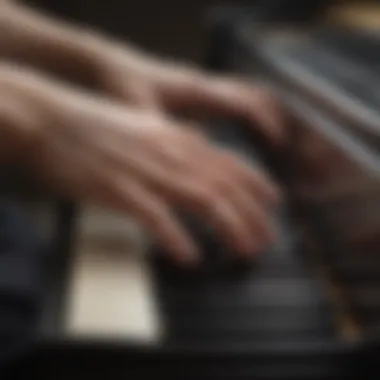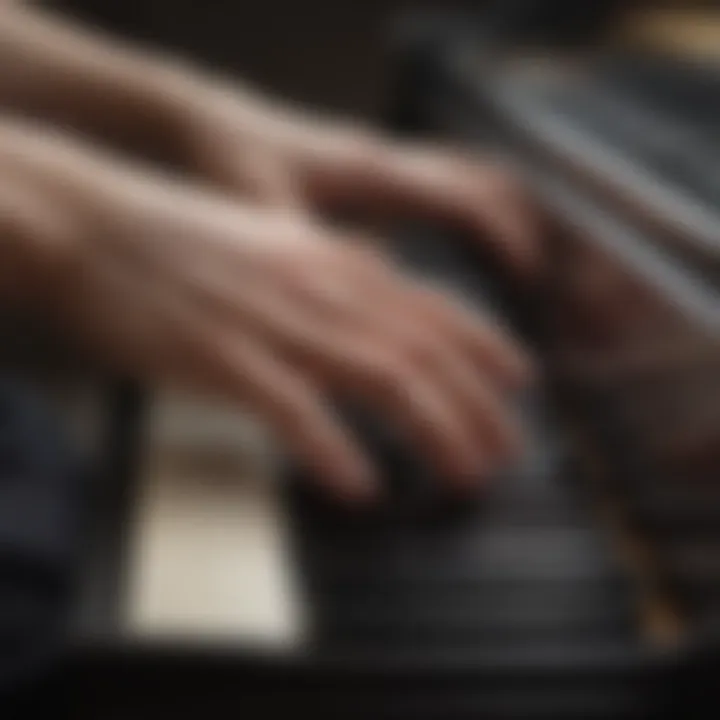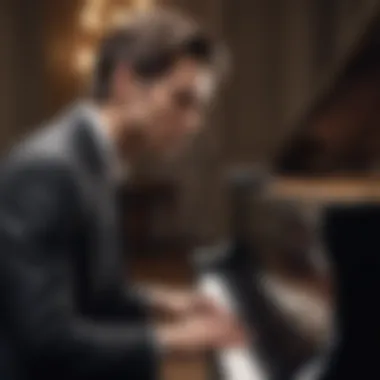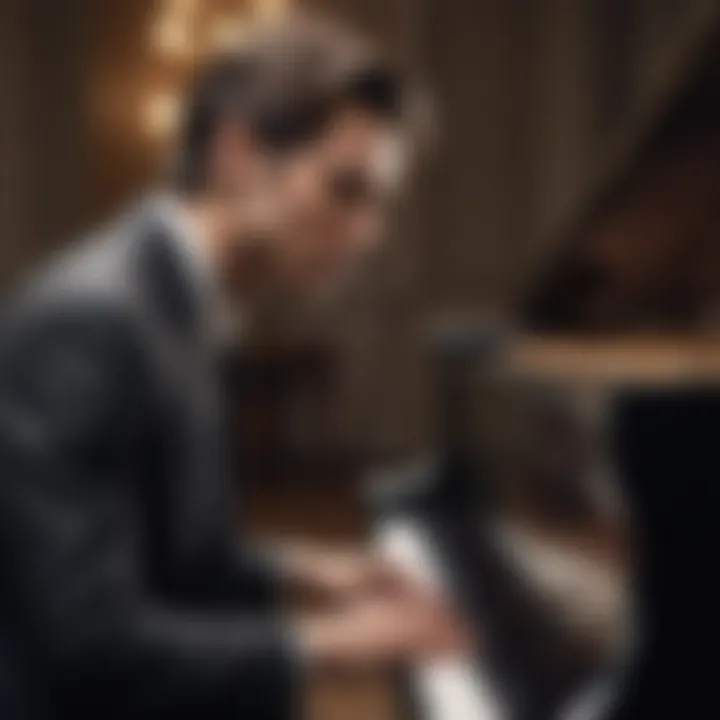The Aspirations of Piano Dreamers: A Deep Dive


Intro
The journey of aspiring to master the piano is neither straightforward nor linear. It is shaped by personal motivations, cultural influences, and the challenges faced along the way. Many individuals dream of becoming proficient pianists, often envisioning the moment they can play their favorite pieces flawlessly. For some, this aspiration comes from a deep-seated love for music, while for others, it may stem from the desire for self-expression or emotional catharsis.
This article seeks to illuminate the intricate relationship between these aspirations and the psychological and cultural contexts that surround them. By examining the motivations, obstacles, and transformative potential of music education, we hope to provide a compelling overview of what it means to be a piano dreamer.
Artist Profile
Biography and Background
Many piano dreamers come from diverse backgrounds, each with unique experiences that influence their musical journey. Some may grow up in homes where music is a central theme, while others might discover their passion later in life. This spectrum of backgrounds provides a rich soil for talents to flourish. Factors such as family support, exposure to music at a young age, and community resources shape their trajectory.
Major Influences and Inspirations
The motivations for pursuing piano mastery can vary significantly among individuals. A few potential influences include:
- Personal experiences: Childhood memories involving music or moments of inspiration can spark a desire to play.
- Cultural narratives: The portrayal of musicians in media often captivates aspiring pianists.
- Role models: Many piano dreamers find inspiration through renowned musicians like Ludovico Einaudi or Wolfgang Amadeus Mozart, leading them to strive for a similar level of excellence.
Through their personal stories, piano dreamers reveal their unique paths marked by ambition and a yearning for artistic fulfillment. This insight offers a glimpse into the diversity of experiences that motivate individuals to pursue this craft.
Challenges Faced by Aspiring Pianists
The road to becoming a proficient pianist is often fraught with challenges. Many face:
- Technical difficulties: Mastering finger placement and scales can be daunting for beginners.
- Time management: Balancing practice with daily commitments often proves challenging.
- Mental barriers: Self-doubt and fear of failure can hinder progress.
Understanding these obstacles is crucial for aspiring musicians. Recognizing them enables learners to develop effective strategies to overcome adversity, fostering resilience and growth.
Transformative Impact of Music Education
"Music education is a powerful tool that can transform not only the dreams of individuals but also the entire community."
Through structured lessons and supportive environments, music education empowers students, equipping them with the tools to realize their artistic visions. The support from educators and fellow musicians creates a nurturing atmosphere that fosters creativity and expression.
Understanding the Concept of Piano Dreaming
The phenomenon of piano dreaming encompasses the myriad aspirations and ambitions of individuals who yearn to master this instrument. It is not merely about playing notes or performing in front of an audience. Instead, it is a complex exploration of what it means to connect deeply with music. To understand piano dreaming fully, one must look at the motivations behind these pursuits and the broader implications they hold for individual growth and cultural enrichment.
Piano dreaming serves multiple functions. For aspiring musicians, it ignites a passion that often leads to emotional and intellectual developments. This pursuit provides a sense of accomplishment and can often reflect personal identity. It offers an avenue for creative expression that may not be evident in other aspects of life. Therefore, it is critical to consider how these aspirations benefit individuals and the community at large.
Defining Piano Dreamers
Piano dreamers are individuals of varying ages and backgrounds who harbor the ambition to learn and excel at the piano. These individuals have diverse motivations, ranging from a desire for artistic self-expression to a professional aspiration of becoming accomplished pianists. The definition of a piano dreamer is not confined to technical skill alone; it includes the emotional connection to music and the transformative journey they undertake throughout their education.
Key characteristics of piano dreamers often include:
- A deep passion for music
- A commitment to learning, despite obstacles
- An acknowledgment of the emotional journey that accompanies piano playing
- A desire for personal growth and achievement
- An appreciation for the cultural significance of piano music
Historical Context of Piano Aspirations


The aspiration to play the piano is steeped in historical significance. Throughout history, the piano has held a prominent place in Western music, evolving from its invention in the 18th century to its current status as a staple in various musical genres. Many renowned composers, such as Ludwig van Beethoven and Claude Debussy, have contributed to the rich tapestry of piano music, inspiring countless aspiring musicians.
In different eras, the piano signified social status and sophistication. In the 19th century, owning a piano was a common aspiration for many middle-class families, symbolizing cultural refinement. As society evolved, so did the accessibility of piano education, leading to a broader demographic of learners who aspire to play not merely for leisure but as a means of emotional release and personal expression.
Additionally, the development of piano teaching methods, driven by innovative pedagogues, has further supplemented these aspirations. The rise of online resources and digital platforms has also revolutionized how individuals learn to play the instrument, making it accessible to a wider audience than before.
As one investigates the concept of piano dreaming, it becomes clear that it is a confluence of personal ambition, historical context, and cultural significance. This comprehensive understanding sets the stage for exploring the underlying psychological motivations that propel individuals toward their dreams in the realm of piano.
Psychological Motivations Behind Piano Dreaming
In the journey of mastering the piano, the psychological motivations play a crucial role. These motivations drive individuals to pursue their passion for music, influencing the way they approach learning and the obstacles they face. Understanding the psychological aspects of piano dreaming enhances appreciation for the process and outcomes of piano study. This section explores three core motivations: the desire for creative expression, the emotional and therapeutic benefits of piano playing, and the ambition towards achievement in music.
The Desire for Creative Expression
The desire for creative expression sits at the heart of many aspiring pianists. For them, the piano is more than a musical instrument; it becomes a medium through which emotions and ideas can be communicated without words. Through playing, individuals often explore their creativity, allowing them to express thoughts that may be hard to articulate verbally.
This motivation can manifest in different forms. Some may enjoy interpreting classical pieces, while others might prefer composing original works. Each approach requires fundamental skills, yet they all share the same underlying goal—conveying feelings and connecting with listeners. The act of creating or performing music fosters a sense of achievement and fulfillment. Those who identify as piano dreamers often find joy and liberation through their music, which reflects their unique identities and personal experiences.
Emotional and Therapeutic Benefits of Piano Playing
Engaging with the piano offers significant emotional and therapeutic benefits. Research suggests that playing music can lead to reductions in anxiety and depression, leading individuals to a more balanced state of mind. The brain releases dopamine during music-making, promoting feelings of pleasure and satisfaction. Such responses are especially beneficial for those grappling with challenges in their lives.
Moreover, the learning process itself can provide comfort. Focusing on the mechanics of playing can serve as a form of escapism, placing personal struggles on hold. Many find solace in the repetitive motions of pressing keys and practicing scales. This therapeutic effect not only aids mental health but also strengthens cognitive functions, helping learners with memory improvement and concentration.
Ambition and Achievement in Music
The ambition to achieve in music motivates many piano dreamers. They aspire to not only master the instrument but also to perform publicly, participate in competitions, or even pursue music as a career. For many, the journey is not just about mastering the notes, but also the experience of setting goals and accomplishing them. Working towards these milestones instills a sense of discipline and determination, valuable traits that extend beyond music into many facets of life.
Achievements, both small and large, are often celebrated within the musical community. Whether it is completing a difficult piece or successfully performing in front of an audience, these milestones can significantly boost self-esteem. As piano dreamers navigate their journey, they often find that every step taken is a testament to their hard work and perseverance.
The psychological motivations behind piano dreaming highlight the depth of commitment and passion that aspiring pianists possess. They enrich not just the musical experience, but the individual’s overall quality of life as well.
Understanding these motivations helps create a supportive environment for learners. Recognizing the importance of creativity, emotional benefits, and ambition allows teachers, peers, and families to cultivate a nurturing space for piano dreamers to flourish.
Challenges Faced by Aspiring Pianists
Aspiring pianists encounter a myriad of challenges that can impede their journey to mastery. Understanding these challenges is essential for identifying effective strategies to overcome them. Technical difficulties, time management concerns, and self-doubt create significant barriers for learners. These aspects not only affect their skills but also their overall passion for music.
Technical Difficulties in Learning the Piano
Learning to play the piano involves grasping complex techniques and musical theories. Many beginners struggle with finger positioning, reading sheet music, and coordinating both hands simultaneously. Technical intricacies can discourage learners, making them question their capabilities. It is crucial for students to approach these difficulties with patience. Practicing consistently, starting with simpler pieces, and gradually increasing the complexity can enhance proficiency. Some aspiring pianists find video tutorials or online lessons beneficial for visual guidance.
Time Management and Commitment Issues
The pursuit of piano mastery demands considerable time and dedication. Many individuals find it difficult to balance practice with other responsibilities such as work, school, or family commitments. This can lead to frustration and feelings of inadequacy. Establishing a structured practice schedule can help manage time effectively. Setting aside short, focused practice sessions is often more productive than infrequent long sessions. Adopting techniques like the Pomodoro Technique—practicing for 25 minutes, followed by a 5-minute break—can improve focus and retention.
Overcoming Self-Doubt and Performance Anxiety
Self-doubt and performance anxiety are common psychological hurdles for aspiring pianists. Many individuals fear making mistakes in front of others, which can result in severe anxiety during performances. This can hinder their ability to play and enjoy the music. Building confidence is fundamental to overcoming these emotions. Regular practice, participating in informal recitals, and receiving positive feedback from peers can foster a sense of accomplishment. It is important for learners to acknowledge their progress while recognizing the natural learning curve associated with mastering an instrument.


"The ability to conquer self-doubt is a critical step in unlocking a pianist's true potential."
By considering these challenges with a proactive mindset, aspiring pianists can transform obstacles into opportunities for growth. Recognizing the importance of technical skill, time management, and psychological resilience provides learners with a framework for sustained motivation in their musical journey.
The Role of Music Education in Fostering Piano Dreamers
Music education plays an essential role in shaping the trajectory of aspiring pianists. It provides not only the technical skills necessary to master the instrument but also emotional and social support critical for sustaining long-term aspirations. Through structured programs, aspiring musicians can engage with music in a way that enriches their understanding and passion for the piano.
Importance of Structured Learning
Structured learning is vital for anyone serious about mastering the piano. It offers a roadmap that guides learners through the complexities of music theory, technique, and performance. Structured programs often begin with foundational skills, building progressively to advanced concepts. This not only fosters a sense of accomplishment but also ensures that students do not become overwhelmed by the vastness of musical knowledge.
Benefits of structured learning include:
- Clear Progression: Students can see their improvement over time.
- Skill Mastery: Allows for dedicated focus on difficult passages or techniques.
- Discipline and Time Management: Establishes routines that are beneficial outside of music as well.
By engaging in a structured musical environment, piano dreamers can enhance their retention of information and skills, making them more prepared for future challenges.
Influence of Music Teachers on Student Aspirations
Music teachers hold significant influence over their students' aspirations. Their passion for music often translates to enthusiasm in the classroom, which can inspire students. Effective teachers are not just instructors; they act as mentors, guiding their students through the emotional and technical landscapes of music.
The relationship between teacher and student can foster an environment of trust and support. This is crucial for students grappling with self-doubt or anxiety. A nurturing teacher can help cultivate confidence and ambition in their pupils, allowing them to pursue their dreams with vigor.
"A great music teacher can ignite a lifelong love for learning and personal growth in their students."
Community and Peer Support for Learners
Beyond formal education, community and peer support play indispensable roles in the journey of piano dreamers. Being part of a network or community can elevate the learning experience significantly. Participants can share resources, discuss challenges, and celebrate accomplishments together. This sense of camaraderie helps reduce isolation, which is common among learners.
Examples of community support include:
- Local Music Groups: Many cities have ensembles or clubs where musicians can collaborate.
- Online Forums: Websites like reddit.com provide a platform for musicians to connect and share insights.
- Social Media: Sites such as facebook.com can help in forming connections and finding mentors.
Overall, the interplay between music education, teacher influence, and community ensures that piano dreamers receive holistic support. This ecosystem not only aids in skill development but also fuels their passion for the art, as they navigate their musical journeys.
Cultural Significance of Piano Dreaming
The cultural significance of piano dreaming goes beyond just the personal aspirations of individual musicians. It reflects broader societal values, artistic expression, and the sharing of traditions. This section highlights the various ways piano music integrates itself into cultural identity and influence.
Piano Music in Cultural Heritage
Piano music has a deep-rooted connection to cultural heritage around the world. Many cultures have developed distinct styles of piano playing that are often tied to specific historical moments or societal changes. For instance, the classical piano works of composers such as Ludwig van Beethoven and Frédéric Chopin not only showcase technical virtuosity but also embody the artistic trends of their times.
The piano acts as a medium through which culture communicates its stories. In many communities, local musicians blend traditional melodies with contemporary techniques, creating hybrid genres that reflect their unique experiences. This blending serves to preserve cultural narratives while also inviting innovation and new expressions.
Moreover, educational institutions and community programs often emphasize piano music as a gateway to connecting with one’s roots. They encourage learning traditional pieces that resonate with family histories or cultural backgrounds, fostering a sense of belonging among learners. In this way, piano playing becomes not only a craft but also a means of cultural preservation and identity formation.
Representation of Piano Dreamers in Media


In contemporary media, representations of piano dreamers reveal the transformative power of music. Films and documentaries often depict the struggles and triumphs of aspiring pianists, highlighting their dedication and passion. Works like "Shine" tell the story of a talented pianist overcoming adversity, which resonates with viewers and inspires many to aspire towards their goals.
Additionally, social media platforms such as Facebook and Reddit provide spaces where aspiring musicians share their journeys. These platforms allow for global interaction among piano enthusiasts, creating a supportive community. They serve as outlets for showcasing talent, receiving feedback, and connecting with mentors. The dynamic representation of piano dreamers emphasizes the accessibility of music and its ability to unite individuals from different backgrounds.
The cultural significance of piano dreaming is evident in both the preservation of traditions and the dialogue between past and present.
The Future of Piano Aspirations
The future of piano aspirations stands at a pivotal intersection, influenced significantly by both technological advances and shifting cultural landscapes. In this ever-evolving environment, aspiring pianists have the opportunity to redefine their musical journeys. Understanding the trends and forces affecting piano learning is essential for these dreamers as they navigate their aspirations in a world full of possibilities.
Evolving Technology and Its Impact on Learning
Technology transforms how music is taught and learned. With the rise of digital tools like apps and online courses, access to piano instruction has expanded remarkably.
- Online Learning Platforms: Websites like Udemy and Masterclass offer structured courses, enabling learners to study at their own pace with flexibility. This convenience is particularly essential for those managing busy schedules.
- Interactive Tools: Apps such as Simply Piano or Flowkey provide interactive experiences where users can play along while receiving real-time feedback. This immediate response fosters a sense of achievement and encourages continued practice.
- Virtual Lessons: Online video communication platforms allow students to connect with instructors worldwide. This increases the diversity of perspectives in learning methods and styles.
These technological advancements create an ecosystem that supports ongoing engagement and self-improvement. However, they also present the challenge of discernment among learners. Not all tools guarantee quality instruction, and individuals must remain vigilant to find reliable resources.
The Intersection of Genres and New Musical Trends
The blending of musical genres is increasing in popularity. Aspiring pianists are no longer confined to classical music. Instead, they are encouraged to explore a range of styles, including jazz, pop, and even electronic music.
- Cross-Genre Exploration: This approach broadens the expressive capabilities of pianists. An understanding of different genres can enrich the playing style and encourage creativity in composition.
- New Collaborations: Collaboration among artists across genres fosters innovation. For instance, musicians are now combining classical piano techniques with hip-hop rhythms, creating unique sounds that appeal to diverse audiences.
- Social Media Influence: Platforms like Instagram and TikTok showcase snippets of performances that merge genres, further inspiring aspiring musicians. These short clips often reach viral status, motivating viewers to experiment with their musical expressions.
The future of piano aspirations, characterized by such dynamic trends, fuels the growth of aspiring musicians. With both technology and musical diversity as their allies, there is no limit to the horizons these dreamers can achieve.
Culmination: The Ongoing Journey of Piano Dreamers
The exploration of piano dreamers leads us to understand that aspirations in music are not merely fleeting desires; they represent deep-rooted ambitions that grow with effort and experience. The ongoing journey of these individuals involves navigating a multitude of physical, emotional, and cognitive pathways. Each stage of learning and performance consolidates their identity as musicians and nurtures their personal growth.
The pursuit of mastering the piano often reflects broader human experiences. It echoes challenges, triumphs, and the essence of artistic dedication. The act of playing music becomes a profound medium for expressing one's thoughts and emotions. Thus, the journey transforms both the musician and the music itself.
Moreover, the psychological and social dimensions of piano dreaming cannot be overstated. The interplay of internal motivation and external influences, such as mentorship and community support, shapes how dreamers define their paths. In this context, individuals learn not just to play the instrument but also to appreciate the cultural significance of their efforts.
"The pursuit of skill in music is a reflection of life's broader ambitions, demonstrating resilience and the quest for self-improvement."
In discussing the ongoing journey of piano dreamers, we consider several key aspects that highlight their significance:
- Commitment to Learning: The process of refining one’s skills fosters a commitment that extends beyond the piano itself, enhancing discipline in other life areas.
- Personal Transformations: Each note played contributes to a personal transformation and confidence building, reinforcing the dreamer's identity.
- Connection with Others: The connections formed with fellow musicians, mentors, and even audiences create a sense of belonging and community.
Thus, the conclusion of this discourse emphasizes the importance of continual growth and exploration in the lives of piano dreamers. Their journeys are marked by perseverance and the desire for excellence, making their pathways not only about music but about enriching their lives.
Reflection on Personal Growth Through Music
As piano dreamers engage in their craft, they invariably undergo significant personal growth. The act of learning to play the piano can unlock various attributes. These include patience, emotional intelligence, and critical thinking skills. Each practice session becomes a lesson not only in music but also in self-regulation and discipline.
- Emotional Awareness: Playing the piano demands emotional engagement. Musicians often channel their feelings into their performances, creating a unique form of expression that can be therapeutic.
- Cognitive Development: The complexities involved in learning to read music and play different pieces strengthen cognitive abilities, enhancing memory and concentration.
This development is reflected in their increased confidence and ability to tackle challenges—both musical and personal. As they progress, they acquire a clearer sense of identity, often feeling empowered by their accomplishments.
The Lifelong Aspirations of Piano Enthusiasts
Piano enthusiasts often embark on a journey characterized by lifelong aspirations. Music is not merely a hobby for these individuals; it serves as a pivotal part of their lives. Through the years, their relationship with the piano may evolve, but their commitment usually remains steadfast.
- Continuous Learning: Many seek advanced techniques and compositions, always striving to improve and innovate. The learning never truly ends, as each new piece or genre presents fresh challenges.
- Community Engagement: Many enthusiasts involve themselves in communities, whether through teaching, performing, or collaborating with other musicians. This fosters a sense of belonging and shared passion.
In this pursuit, they find not only personal satisfaction but also a deeper connection to the world of music and to others who share their dreams. Their passion may inspire future generations, creating a legacy of aspiration and creativity that reflects the true spirit of piano dreaming.







